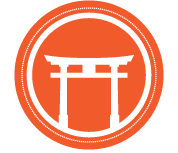Introductions!
In the Dojo Volume 3 Issue 3
By Josh Paul Sensei, AOSB head instructor
Meet 9-Year-old dojo member Henry Phillips
and Floating Bridge Communications
Member Spotlight: Henry Phillips
Henry after his 2019 promotion to green belt.
In the Dojo: Henry, how old are you and how old were you when you started doing aikido?
Henry Phillips: I was four when I started and I am 9 years old now. Almost 10.
ItD: Did you pick aikido or did your parents pick it for you?
HP: Well, my mom thought I should be doing martial arts, so she showed me a karate video, but I couldn’t imagine myself doing it. I wasn't so sure about it.
ItD: Martial arts in general or karate?
HP: I just couldn't imagine myself doing what they were doing--mostly punching and kicking. They were attached to ceiling ropes and things. And sometimes I was like, I can't imagine myself doing that. So then my mom brought me here [AOSB]. I watched about, let's say two thirds of one of the classes. I kinda liked it. There were a few things that I thought were funny.
ItD: What did you think was funny?
HP: Well, you know how you would sometimes hold out the soft bokken and we'd roll over it. I remember seeing one of the kids just walk around it. That was super funny.
So I started and when I started, I was like, oh my God, this is crazy. Am I even sure about this? And then, once I got further on, and I earned a yellow belt, and got really good at the forwards rolls, it kind of gave me some confidence. And like, after a while, I was the highest ranked in the class. I remember one time when we were lined up, I thought, wow, it took forever, but I’m actually the highest ranked person here. Well, aside from Sensei.
ItD: That was in the children's program? When you were 6. You then avanced to the youth program?
Henry and Julianne demonstrating at the 2019 Cherry Blossom Festival at the Brooklyn Botanic Garden.
HP: Yes, I did it early. I did it a month before I turned 6.
ItD: Right...because we ran out of ranks for you. We promoted you to orange belt.
HP: I remember my first youth class. I hadn’t gotten my orange belt yet, and I was like, this is kind of weird.
ItD: How did it feel being with the bigger kids?
HP: It felt kinda weird and also at the same time kind of cool.
ItD: Has aikido changed your life outside the dojo?
HP: Well, I always get into fights with my [younger] brother, and it kind of helps in that position.
ItD: It helps prevent the fights or it helps you beat him up?
HP: Kind of both. [laughter] We just got into a small fight on the way here. We were running down the block in a race. And he punched at me, I moved to the side and I pinned his arm down.
Henry (right) with classmate Hazel, 2016.
ItD: Do you think Covid has changed the way you think about aikido?
HP: That's hard. It's only changed the way we are practicing. We still practice and we found a way to do it. Like we can use a bokken or jo. And it's kind of made me think about more of the other person, because if we get too close one of us could get Covid.
ItD: What keeps you coming back to aikido?
HP: That is very tough. I think I like the fact that I can actually have some time away from my family. We've been stuck inside our house for like 5 days. That actually happened. Me and my brother. And we haven’t even gone outside in our backyard, and I just need to get out! I remember this one time we’d been stuck in the house for like 3 days. I had aikido, and my dad's like jealous! I also think aikido is really fun.
Floating Bridge Communications
We are very excited to introduce a new AOSB project: Floating Bridge Communications. FBC was born out of a love of aikido and writing, and the belief that aikido and other traditional martial arts remain relevant, needed, and effective in the 21st century. The arts have not changed, but information and its dispersal and consumption have changed. In-person, word-of-mouth referrals, which we relied on for so long, are no longer sufficient. An online, social presence that goes beyond a brochure website is now the standard. Social media is the new word of mouth.
For example, in 2020 nearly one third of internet users between the ages 16 and 37 discovered a new product or service on social media, as did about one quarter of older internet users. Nearly 50% of all internet users researched a product or service like a dojo on a social platform, Instagram being overwhelmingly the most often used. Social networks are rapidly starting to compete with traditional search engines like Google for discovering and researching products and services.
FBC’s mission is help martial arts schools develop and publish content that reflects the culture and practices of a traditional martial arts dojo. Our services include website copy, Instagram posts, newsletters, one-time or ongoing content creation and support, as well as consultations and workshops. Visit the FBC website or contact FBC to learn more.




